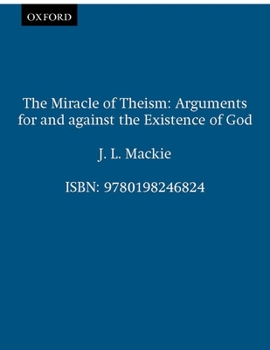The Miracle of Theism: Arguments for and Against the Existence of God
Select Format
Select Condition 
Book Overview
278 pages. This description may be from another edition of this product.
Format:Paperback
Language:English
ISBN:019824682X
ISBN13:9780198246824
Release Date:November 1982
Publisher:Oxford University Press, USA
Length:288 Pages
Weight:0.82 lbs.
Dimensions:0.8" x 5.5" x 8.5"
Customer Reviews
5 ratings
Excellent philosophical critique of theism
Published by Thriftbooks.com User , 17 years ago
The Australian philosopher John Mackie, sadly now deceased, has always been one of my favorite philosophers, and when I heard from several religious people that this was in their view the best critique of religion, I decided to buy it at once. The book is indeed highly rewarding of its praise, for it is the most thorough philosophical (here as opposed to scientific) critique of all (mono)theist apologetics written so far. Unlike such recent anti-theist writers as Dawkins and Dennett, Mackie is extraordinarily charitable to the theists' claims, making sure to mention every possible argument in their favor and using only counter-arguments that could not possibly be considered controversial or contingent on a given scientific theory, etc. In fact, he is much more charitable in some places than is really necessary; I would not have the same patience with the meaningless phrasings of Swinburne or Küng that Mackie has. In any case, Mackie diligently and cordially addresses each of the main issues surrounding theist apologetics: miracles, the ontological argument, the cosmological arguments (including Kalam), moral arguments, the issue of consciousness, free will, the argument from design, the argument from faith alone (Kierkegaard), the argument from popularity (William James), the problem of evil, the possibility of atheist morality, and so on. Mackie shows himself at his best here - an impressive array of arguments and decisive counterarguments, even against such modern superstars of apologetics like William Lane Craig and Alvin Plantinga, are dealt with in sequence with seemingly no effort at all. Not a single theist argument remains standing, and Mackie is sure to remind us at all times that not only is the burden of proof on the theists, but they also have to show their view more likely than not as well as more likely than naturalist explanations, if their view is to succeed. As Mackie makes abundantly clear, this is a bar far too high for any theology whatever to achieve. This book is strongly recommended for everyone interested in religion and philosophy, although the work is written at a high level and is not easy or 'popular' reading. To further dig into the issue of ethics and atheism, I would also recommend reading Mackie's defense of ethical anti-realism: Ethics: Inventing Right and Wrong.
Modern Analytic Arguments for and against God
Published by Thriftbooks.com User , 22 years ago
This book, together with Swinburne's "Coherence of Theism," is among the most valuable books on the philosophy of religion from an Anglo-American analytical-philosophical perspective. While Swinburne goes back to Anselm and Aquinas, this book considers mostly post-1500 theodicy, still covering the ontological argument from Descartes' and a posteriori arguments from Hume. The full spectrum of the arguments for and against God are here, including Kant, Newman, Kierkegaard, James, Phillips, Leslie, Kung, et alia. First, a brief exposition of a philosopher's argument is surveyed, followed by an analysis of where the philosopher's strengths and weaknesses lie. There is even a section on the most notorious of all arguments against the existence of God: the existence of evil. In the final analysis, Mackie believes theism is itself a mircle, hence the title. Overall, this book makes a significant contribution to beginning philosophy students who want a rigorous examination of the crucial questions of God's existence and non-existence. The writing is clear, generally concise, exceptionally well-constructed, and only occasionally labyrinthine.
the best!
Published by Thriftbooks.com User , 22 years ago
this volume will serve, for a long time to come, as the supreme case against the existence of God. written with special attention to swinburne's masterful THE EXISTENCE OF GOD, the book is a must have for any reader in the philosophy of religion. that said, i don't think that mackie's case is quite so strong as many maintain. his argument from evil is, to many, not strong enough to serve as a foundation for affirming the non-existence of God, and for me, not even reason enough to 'flinch' if you are a theist. his rebuttals to various forms of the teleological argument seem to miss the point entirely (see mark wynn's GOD AND GOODNESS). et cetera.but i would be lying if i didn't admit that this book has force. as a theist, i constantly felt intrigued, but never 'threatened'. i highly recommend this book alongside swinburne's THE EXISTENCE OF GOD. God bless and shalom :-)
An excellent book.
Published by Thriftbooks.com User , 24 years ago
Mackie is thorough and fair in his analysis and subsequent destruction of the case for 'rational theism'. This book is a must read for theists and atheists alike, and of course a standard text for any university student. In dealing with the problem of evil Mackie is convincing, but perhaps not forcful enough in his conclusion, but overall this is an excellent book.
Outstanding summary and anlysis
Published by Thriftbooks.com User , 25 years ago
I use this book with my A-Level Religious Studies students to great effect. It clearly and accurately offers thorough-going criticism of all the usual attempts to justify theism rationally. His section on the Problem of Evil should be required reading for all theists.





